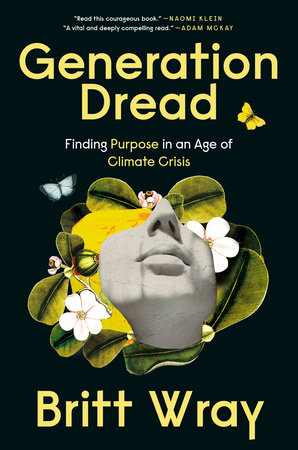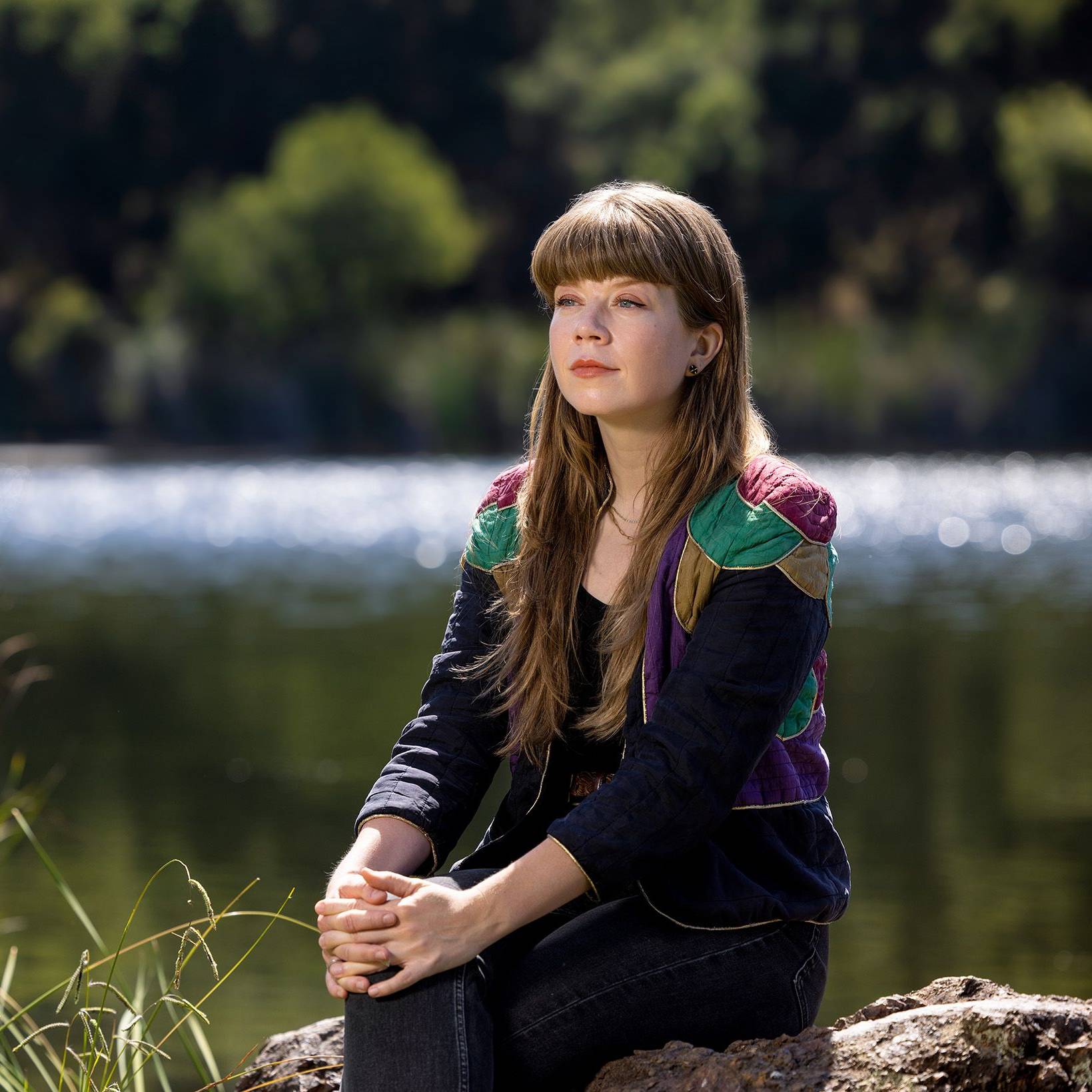Turning Climate Despair into Action Generation Dread
Confronting Climate Change’s Toll on Mental Health
Britt Wray, PhD

Britt Wray, PhD
Turning Climate Despair into Action Generation Dread
Confronting Climate Change’s Toll on Mental Health
In her new book Generation Dread: Finding Purpose in an Age of Climate Crisis, Britt Wray, PhD, tells the story of a young man on a walk during the early days of COVID-19 who was struck by a sudden fear that the pandemic was driven by ecological breakdowns resulting from humanity’s destruction of the natural world. The young man, Charlie Glick, felt a sense of dread and doom considering a “series of increasingly dire crises” bound to arise in the years to come.

Three-quarters of respondents felt that the “future is frightening,” about half said climate anxiety affected their daily lives, and nearly four in 10 feared having children due to the climate crisis.
Yet, Wray says, many suffer in isolation: “A lot of the despair becomes as strong as it does because people don’t have another person who can validate and embrace their tough climate emotions, and reassure them that they’re not crazy.”
She knows from personal experience. Her own journey and current path were spurred by climate grief and anxiety.
An under-recognized but essential aspect of this global health threat is emotional distress. Britt has provided the hard data we need to get people thinking and acting on climate and eco-anxiety.
– Michele Barry, MD
An under-recognized but essential aspect of this global health threat is emotional distress. Britt has provided the hard data we need to get people thinking and acting on climate and eco-anxiety.
– Michele Barry, MD
Forging Purpose Through a Crucible of Emotion
In 2017, Wray felt forced to confront the climate crisis on a personal level when she and her husband, Sebastian, began seriously discussing having a baby. By then, she had been absorbing grim news of planetary destruction for years as a biology student turned science communicator. The question of whether or not to bring new life into a seemingly doomed world caused simmering fear, frustration, and anger to boil over.
“A deep sense of grief and despair came crashing over me when I considered what it would mean to deliver a child into this world,” she recalls in Generation Dread.
A feeling of isolation deepened the crisis, which drove her to explore whether others were experiencing similar existential fears. Through conversations and research, she learned that she was not alone and became connected to a burgeoning community that offered strength and resolve.
Over the last five years, Wray worked her way through this crucible of emotion and forged a new sense of purpose — and a new livelihood. She began to research the mental and emotional toll exacted by the climate crisis and environmental destruction and in 2017 launched a popular newsletter about eco-anxiety.
Through this work, she met Glick and many others like him. Glick, Wray writes, eventually found support and purpose by connecting with like-minded groups, working with a climate-aware therapist to understand and cope with his emotions, and moving in with his aging aunt to save resources and forge connections. “He was learning to live with the planetary health crisis and accept its gravity with some lightness, in his own way,” says Wray.
But not everyone Wray spoke with found their way to this place of acceptance and beyond it towards constructive responses. Her research made clear the gap between the devastating nature of many people’s climate anxiety and the mental health support that existed for them. Wray herself continued to struggle with deep emotional distress over the climate crisis.
“I figured that I could contribute to helping close this gap if I devoted my career to it,” she says, “and that this purposeful mission would give my work meaning and simultaneously help with my own coping.”
Around that time, she learned about the new Stanford/LSHTM Planetary Health Fellowship and applied.
A deep sense of grief and despair came crashing over me when I considered what it would mean to deliver a child into this world.
– Britt Wray, PhD
A deep sense of grief and despair came crashing over me when I considered what it would mean to deliver a child into this world.
– Britt Wray, PhD
A Pioneering Fellowship
The Planetary Health Fellowship is a postdoctoral program created in 2020 by Stanford and LSHTM to generate more research and evidence about the health impacts of climate change and environmental degradation. The unique partnership enables wide-ranging multidisciplinary support for early-career researchers in tackling pressing questions, with each institution’s distinct strengths complementing the other’s.
The fellowship was envisioned by Barry and LSHTM’s former dean Peter Piot, with inspiration from Kathy Burke, CIGH senior adviser and current planetary health lead at the Stanford Woods Institute for the Environment. It was made possible with support from CIGH Executive Director Allison Phillips and Kari Nadeau, MD, PhD, the Naddisy Foundation Professor of Pediatric Food Allergy, Immunology, and Asthma, who helped secure funding from the Sean N. Parker Center for Allergy and Asthma Research.
Wray was joined by another inaugural fellow also focusing on the effects of climate change on mental health and well-being: Elaine Flores-Ramos, MD, PhD, a Peruvian doctor at LSHTM’s Centre on Climate Change and Planetary Health and Centre for Global Mental Health, who has studied chronic posttraumatic stress disorder following disasters in Peru. During the fellowship, Flores-Ramos has focused on climate and environmental disasters’ impact on women’s mental health in low- and middle-income countries. “I believe that empowering women as educators, caregivers, holders of knowledge, researchers, and agents of social change will improve mitigation and adaptation policy interventions and will help inspire new ways of thinking that will develop a resilient and sustainable planet,” she says.
The center recently announced its second cohort of three fellows and hopes to secure funding to expand the fellowship — for instance, bringing on more fellows each year or partnering with universities in Africa and Asia to host additional fellows, says Phillips.
The fellowship, Wray says, has provided a platform for conducting collaborative scientific research in a burgeoning field with outstanding global researchers. She considers this work a form of “scholarly activism” that also enables her to influence policy makers.
Hope and Hard Work
Through her professional journey, Wray has discovered the importance of “holding a balance between hope and fear” without giving in to the binary that often separates them.
Through her parallel personal journey, she says, she experienced a fundamental change in outlook forged by gaining connections, joining climate action groups, and processing her climate emotions. One result of this change? Last fall, she and her husband welcomed a baby into the world.
“All this helped me to move through my feelings and use them in a way to ask: ‘OK, how am I going to be at this time with this one life I have?’” she recalls. “I found that I could accept things for being as turbulent as they are and move towards them with a disposition of joy. Once I made these shifts and devoted myself to working on planetary health issues, I felt connected to a deeper meaning and purpose. It was only then that I finally felt like I could have a child.”
With a growing family, a newly published book, and a year of fellowship research behind her, Wray finds herself hopeful — “in a gritty way.” She finds hope in the increased awareness and movement to solve these problems. But she also sees considerable work yet to be done in normalizing, rather than pathologizing, climate-driven emotional distress and providing adequate support for the millions of people suffering from it.
To this end, Wray secured a Stanford Global Health Seed Grant alongside Daryn Reicherter, MD, clinical professor of psychiatry and behavioral services, to pilot supports for youth and elders with eco-anxiety in Nigeria, London, and several U.S. sites. It will be one of the first interventions for eco-anxiety to be evaluated in the growing field of climate change and mental health, she says.
“At the same time that people are waking up to climate awareness and feeling really emotionally distressed, there is also the rise of awareness, research, and support around what to do with these challenges,” Wray reflects. “And that is incredible because it wasn’t there before.”

“I figured that I could contribute to helping close this gap if I devoted my career to it… and that this purposeful mission would give my work meaning and simultaneously help with my own coping.”
– Britt Wray, PhD
Resources for working with climate emotions
A sampling of a larger resource list developed by Gen Dread and The All We Can Save Project
Climate-aware therapy
If you find yourself feeling so depressed, anxious, or overwhelmed by the climate crisis that you’re struggling to stay afloat or stay in the work, it might be a great time to call a climate-aware therapist
Emotional methodologies
These emotional practices, often group-based, are designed to help people process climate emotions and are not necessarily facilitated by a mental health professional.
Climate conversations
These platforms enable connections with others experiencing similar emotions and provide the opportunity to share openly.
Online resource hubs
These storehouses of resources and stories of how others are integrating these tough feelings into their lived experiences can help one feel less alone and more engaged.
Gen Dread (Wray’s newsletter)
